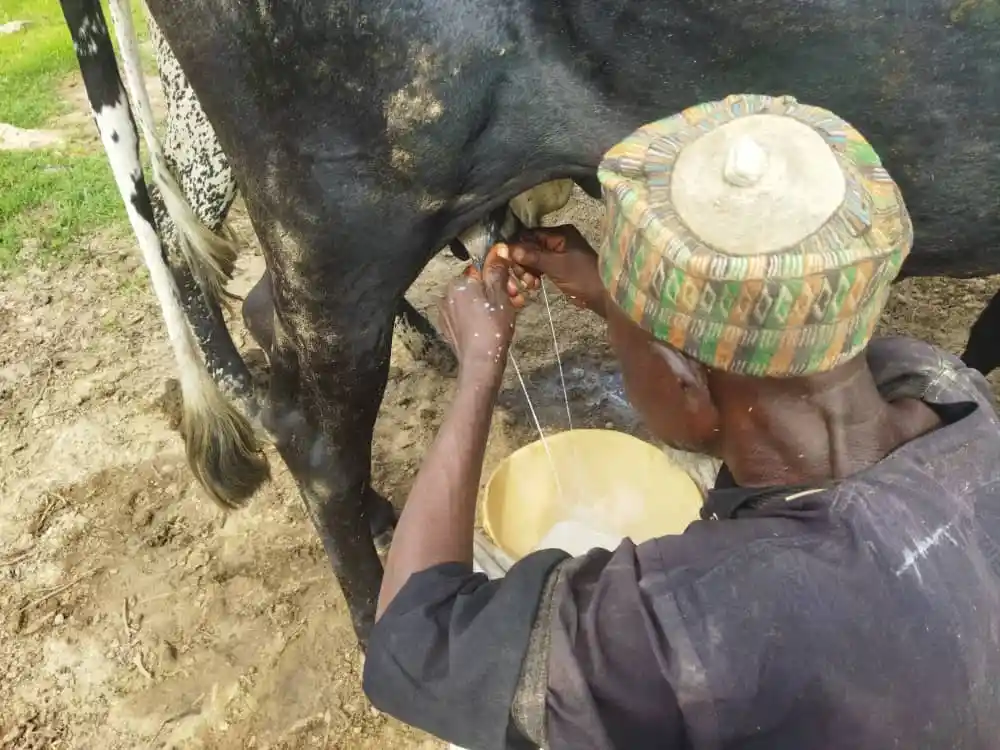Nigeria may be undergoing a transformation, one that stands to reshape not just agriculture but the nutrition and livelihoods of millions of its citizens.
At a recent agro-development meeting in Abuja, Idi Mukhtar, Minister of Livestock Development, reaffirmed the federal government’s commitment to revamping Nigeria’s dairy industry.
Central to the discussion is the Nigeria Livestock Growth Acceleration Strategy (NL-GAS), a programme led by the private sector to augment milk production, reduce reliance on imports, and unlock investments.
While Mukhtar acknowledged existing challenges, such as inadequate milk collection infrastructure, high transportation costs, and inadequate infrastructure, he emphasised a multi-pronged strategy that includes state-level collaboration, land allocation for livestock transformation, and the promotion of sustainable practices like the use of grazing reserves.
But this is not just another loft policy declaration. It’s a continuation of an entire ecosystem of solutions already taking shape. In Niger, Plateau, and Kano, public-private dairy innovation platforms have been working quietly.
These platforms bring together pastoralists, cooperatives, and small-scale processors in a model that not only shortens the supply chain but also builds local capacity. With improved breed selection and veterinary care in these centres, productivity is increasing while youth are being trained as veterinary assistants and dairy technicians.
This model gives practical meaning to the NL-GAS blueprint, suggesting that Nigeria is not starting from scratch but rather scaling what works.
International support is also reinforcing this momentum. The French development agency (AFD), in collaboration with ECOWAS is finalising grants that will directly support Nigerian milk producers.
It adds to ongoing projects like Value4Dairy Consortium, which benefited smallholding dairy farmers in Kaduna to enhance productivity and access to market. These multi-stakeholder efforts are designed not only to increase milk output; they are expected to enhance backward integration, where transnational, large dairy corporations are investing in local processing instead of exporting dry milk.
This change has potential for job creation across the entire value chain, from animal rearing to distribution and transportation.
What does this mean for Nigeria?
It’s a game changer for nutrition, economic empowerment, and conflict resolution. With over 47 million children to feed, local dairy can sustain school feeding programs and complement child nutrition generally.
Meanwhile, grazing reserves and better ranching techniques decrease pastoralist migrations, one reason behind pastoral-farmer conflicts across Niger’s Middle Belt and northern regions. In drawing lines between animal policy and food protection to national security, the government is solving more than a dairy problem; it’s addressing a web of related social issues.
The story of Nigeria’s dairy sector is no longer one of unfulfilled potential. Rather, it is becoming a model of how strategic coordination, private sector innovation, and international collaboration can shift a national narrative.
It also offers a hopeful message for other West African countries wrestling with similar issues. If these plans are followed through with consistency and political will, Nigeria may soon begin exporting more than just oil; it could export a success story in sustainable agriculture, inclusive growth, and food sovereignty.
For young farmers, local businesses, and millions of families, this is not just an economic story. It’s a story of hope.
Nigeria is experiencing a significant transformation in its dairy industry, poised to enhance agriculture, nutrition, and livelihoods. At an agro-development meeting in Abuja, the federal government, led by Minister Idi Mukhtar, reasserted its dedication to rejuvenating Nigeria's dairy sector. Central to this effort is the Nigeria Livestock Growth Acceleration Strategy (NL-GAS), which seeks to boost milk production, decrease import reliance, and attract investment. Challenges like inadequate infrastructure and high transportation costs remain, but a multi-faceted approach involving state collaboration and sustainable practices is underway. Existing public-private dairy innovation platforms in regions like Niger, Plateau, and Kano are paving the way by integrating pastoralists, cooperatives, and processors, leading to increased productivity and skill development in dairy-related fields.
International support from bodies like the French Development Agency and collaborations with ECOWAS are also fortifying this transformation. Ongoing initiatives such as the Value4Dairy Consortium further contribute by enhancing productivity and market access for small-scale dairy farmers. The focus is not simply on expanding milk production; it encompasses a shift towards local processing over importing, fostering job creation throughout the value chain.
The implications for Nigeria are vast, promising improvements in nutrition, economic empowerment, and conflict resolution. With substantial child feeding needs, local dairy production can play a critical role in supporting school programs and child nutrition. Moreover, enhanced ranching techniques and grazing reserves are reducing migrations linked to pastoral-farmer conflicts, showcasing how coordinated efforts in the dairy sector can address broader societal challenges. Nigeria is on the brink of becoming an exemplar in sustainable agriculture and food sovereignty, potentially setting a precedent for other West African nations. For young farmers and local businesses, this evolution represents much more than economic advancement—it is a beacon of hope and progress.






